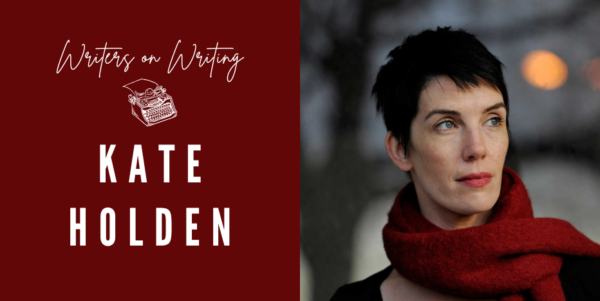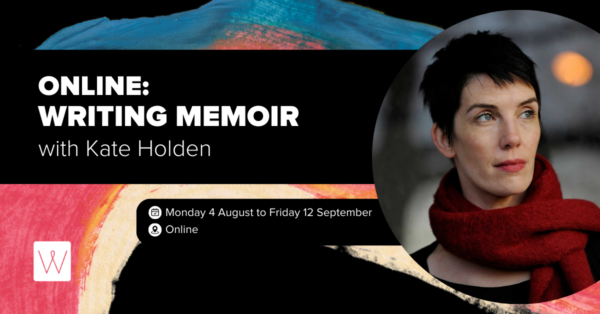
Writers on Writing is our regular conversation with a writer or industry professional about the writing craft, industry insights, and their own practice. This week, we spoke to Kate Holden about the delicate business of writing memoir, including writing real people, and if a memoir can involve fiction.
You said in the description for your upcoming course that “Memoir is an old form, going back to the Middle Ages or earlier.” Why do you think people continue to feel so compelled to read and write life stories?
We’re such social creatures, always checking on those around us for cues and variety. Not necessarily in a neurotic way – we love difference! It’s exciting to encounter, through a memoir, a life lived in a way completely different to our own. It’s also reassuring to see our own experiences shared and reflected by others. And real-life stories can so often surpass fiction in strangeness and parable. We’re curious to look at our own lives and stories, too, because we sense that there are mysteries in there; or we have learned things the hard way and want to tell what it’s like so others can learn.
For people like yourself who have a very storied past, how do you go about selecting the parts of your life that are most relevant to the story you want to tell?
I don’t think I planned to write memoir, and when I did, it wasn’t with the intention of showing off dramatic parts of my life – more, that I wanted to explain things, and the best way was to show how it was that I’d learned them myself. Other times I write personal material in order to own the perspective I’m making – that is, if I’m arguing a case, I want to show why I personally have come to that position. Sometimes also, I’ve just lived an experience that seems so much like fiction or fable that it feels too good to keep to myself!
What’s the most important thing to keep in mind when considering the ethical issues with writing about real people in a memoir?
I think it’s ‘do unto others.’ Some of us have the experience of being depicted by others – it’s a very weird sensation, and I always urge memoirists to recall or imagine what it’s like, to be presented to a world of unknown readers, in a way that you don’t control or participate in. I think it’s difficult, but we must think of ourselves as responsible custodians for others’ stories. Don’t treat them carelessly!
What are some great memoirs you’ve read in recent years, and why?
I absolutely love Annie Dillard’s writing, such as her Pulitzer Prize-winning Pilgrim at Tinker’s Creek, which mixes personal perspectives with nature writing and philosophy; I have just started Rachelle Unreich’s A Brilliant Life, about her mother and the Holocaust, and I have to mention my dear friend Alice Williams’s Bad Yogi, which surprisingly mixes comic portrayals of training to be a yoga teacher with some really poignant revelations about her mental health, young womanhood and life in Melbourne.
For those who don’t know, what is the difference between autobiography, memoir, and personal essay?
Autobiography, I guess, is the formal version, written about your own life in a straight, chronological way without bells and whistles. Memoir tends to be more bendy, elastic—with literary style or devices, maybe telling only one part of your story, and telling it ‘slant’, as Emily Dickinson said. A personal essay can also be just memoir, or something that blends memoir passages with another topic, such as politics, religion, nature, travel etc.
How much can and should a writer fictionalise when writing compelling memoir?
It’s a big question, whether you should fictionalise at all! I think real life is usually sufficient, but it needs shaping and paring and crafting, and fictional techniques can help with that. Breaking a reader’s trust by simply inventing things is probably not helpful unless you’ve clearly signalled it. But you can dramatise scenes or arrange a narrative in similar ways to how you might with fiction. It makes it feel more vivid, but as I say, it’s a delicate business and easy to get carried away with ‘what if….’!
Kate Holden is the author of The Winter Road: A killing at Croppa Creek (Black Ink, 2021). Her memoirs In My Skin (2005) and The Romantic (2010) were bestsellers published by Text Publishing and internationally. Kate wrote a popular column for The Age for several years and has widely published essays, short stories, and literary criticism, and in various anthologies, appearing most recently with portraits and features in The Saturday Paper. She lives in the Illawarra.
Join Kate Holden for her online course Online: Writing Memoir, Monday 4 August to Friday 12 September 2025, online.
If you want to be the first to read great advice, prompts and inspiration from our incredible tutors, subscribe to our weekly e-newsletter Newsbite.
More from Writing NSW
Check out our full range of writing courses in Sydney, our online writing courses and our feedback programs to see how we can help you on your creative writing journey. Find out about our competitions and opportunities, as well as writing groups across NSW, and sign up to our weekly newsletter for writing events, opportunities and giveaways.

